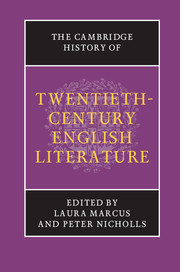Book contents
- Frontmatter
- Introduction
- PART ONE WRITING MODERNITY
- PART TWO THE EMERGING AVANT-GARDE
- PART THREE MODERNISM AND ITS AFTERMATH, 1918–1945
- PART FOUR POST-WAR CULTURES, 1945–1970
- PART FIVE TOWARDS THE MILLENNIUM, 1970–2000
- 32 The Seventies and the cult of culture
- 33 Feminism and writing: the politics of culture
- 34 The half-lives of literary fictions: genre fictions in the late twentieth century
- 35 Theatre and politics
- 36 Irish literature: tradition and modernity
- 37 Scottish literature: Second Renaissance
- 38 Towards devolution: new Welsh writing
- 39 British–Jewish Writing and the turn towards diaspora
- 40 Fiction and postmodernity
- 41 Postcolonial fictions
- 42 Writing lives
- 43 Poetry after 1970
- 44 Ending the century: literature and digital technology
- Bibliography
- Index
- References
43 - Poetry after 1970
from PART FIVE - TOWARDS THE MILLENNIUM, 1970–2000
Published online by Cambridge University Press: 28 March 2008
- Frontmatter
- Introduction
- PART ONE WRITING MODERNITY
- PART TWO THE EMERGING AVANT-GARDE
- PART THREE MODERNISM AND ITS AFTERMATH, 1918–1945
- PART FOUR POST-WAR CULTURES, 1945–1970
- PART FIVE TOWARDS THE MILLENNIUM, 1970–2000
- 32 The Seventies and the cult of culture
- 33 Feminism and writing: the politics of culture
- 34 The half-lives of literary fictions: genre fictions in the late twentieth century
- 35 Theatre and politics
- 36 Irish literature: tradition and modernity
- 37 Scottish literature: Second Renaissance
- 38 Towards devolution: new Welsh writing
- 39 British–Jewish Writing and the turn towards diaspora
- 40 Fiction and postmodernity
- 41 Postcolonial fictions
- 42 Writing lives
- 43 Poetry after 1970
- 44 Ending the century: literature and digital technology
- Bibliography
- Index
- References
Summary
George Barker replied mischievously to a questionnaire sent to poets by the magazine Agenda in 1989: ‘You kindly invite me to make “a few remarks about the state of poetry in England and Ireland” or something such. I have only one remark which is that I have been seeking far and wide for this fabulous mastodon and in several years only glimpsed it once and I think it was called a Tony Harrison.’ Is the idea of an English or a British poetry really extinct, and if not, can it be embodied in representative poets such as Tony Harrison (or other influential figures such as Simon Armitage, Carol Ann Duffy, Jenny Joseph, Andrew Motion, J. H. Prynne, Tom Raworth or Denise Riley)? Many poets and editors appear to think not, and to agree with the poet Michael Schmidt (who would seem to be in a unique position to judge, having created the leading independent poetry press, Carcanet, and edited the most influential poetry review, PN Review): ‘I detect no coherence in the poetry scene, readership, approaches, or anything else in Britain.’ Throughout the past thirty years there has been a pervasive insistence on singularity, typified by this remark from Geoffrey Hill: ‘I’ve not found that anybody’s expectations have led me to qualify or modify my own work.’ Some poets regret this. Lee Harwood says: ‘I once believed in the idea of a community of artists, I think mainly because [of] that whole sixties’ euphoria, but reality contradicted that fairy tale.’
- Type
- Chapter
- Information
- The Cambridge History of Twentieth-Century English Literature , pp. 768 - 786Publisher: Cambridge University PressPrint publication year: 2005
References
- 1
- Cited by

